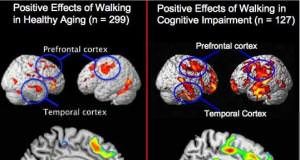Infections May Lead To Faster Memory Loss In Alzheimer’s Disease
Getting a cold, stomach bug or other infection may lead to increased memory loss in people with Alzheimer's disease, according to research published in the September 8, 2009, print issue of Neurology®, the medical journal of the American Academy of Neurology.
Eating Berries Benefits The Brain
Strong scientific evidence exists that eating blueberries, blackberries, strawberries and other berry fruits has beneficial effects on the brain and may help prevent age-related memory loss and other changes, scientists report. Their new article on the value of eating berry fruits appears in ACS' Journal of Agricultural and Food Chemistry.
Overeating May Double Risk Of Memory Loss
New research suggests that consuming between 2,100 and 6,000 calories per day may double the risk of memory loss, or mild cognitive impairment (MCI), among people age 70 and older.The study was just released and will be presented at the American Academy of Neurology's 64th Annual Meeting in New Orleans April 21 to April 28, 2012. MCI is the stage between normal memory loss that comes with aging and early Alzheimer's disease.
New Theory Links Depression To Chronic Brain Inflammation
Chronic depression is an adaptive, reparative neurobiological process gone wrong, say two University of California, San Diego School of Medicine researchers, positing in a new theory that the debilitating mental state originates from more ancient mechanisms used by the body to deal with physical injury, such as pain, tissue repair and convalescent behavior.
Landmark Report Reveals Massive Global Cost Of Alzheimer’s: One Percent of...
A landmark report on the Global Economic Impact of Dementia finds that Alzheimer's disease and other dementias are exacting a massive toll on the global economy, with the problem set to accelerate in coming years.
Walking Slows Progression of Alzheimer’s, Study Suggests
Walking may slow cognitive decline in adults with mild cognitive impairment (MCI) and Alzheimer's disease, as well as in healthy adults, according to a study presented November 29 at the annual meeting of the Radiological Society of North America (RSNA).
Alzheimer’s: Therapy For Brain Disease Could Target Blood
The aggregated proteins strewn about the brain are the hallmark of one of the most common neurodegenerative disorders: Alzheimer's disease. But while these irregular, gunky proteins, called amyloid-β, are believed to contribute to the deterioration of memory and cognitive ability in Alzheimer's patients, no one knows how they lead to these symptoms, and the severity of the dementia doesn't directly depend on the amount of amyloid-β plaques found in diseased brains.
Therapies To Improve Biochemical Functions Hold Promise As Treatments For People...
Two promising new treatments to aid people with autism have shown effectiveness in pilot studies conducted by an Arizona State University professor and private researchers.Several studies indicate that children with autism often have abnormalities in critical biochemical functions that help maintain health -- specifically methylation, glutathione, and mitochondrial functions. Methylation turns proteins in the body on and off -- including DNA and RNA -- a function that controls gene activity.
Natural Alzheimer’s-Fighting Compound Created Inexpensively in Lab
Scientists at Yale University have developed the first practical method to create a compound called huperzine A in the lab. The compound, which occurs...
Scientists Pinpoint How Vitamin D May Help Clear Amyloid Plaques Found...
A team of academic researchers has identified the intracellular mechanisms regulated by vitamin D3 that may help the body clear the brain of amyloid beta, the main component of plaques associated with Alzheimer's disease. Published in the March 6 issue of the Journal of Alzheimer's Disease, the early findings show that vitamin D3 may activate key genes and cellular signaling networks to help stimulate the immune system to clear the amyloid-beta protein.
Memory Declines Faster In Years Closest to Death; Mental Activity Best...
New research finds that a person's memory declines at a faster rate in the two- and-a-half years before death than at any other time after memory problems first begin. A second study shows that keeping mentally fit through board games or reading may be the best way to preserve memory during late life. Both studies are published in the April 4, 2012, online issue of Neurology®, the medical journal of the American Academy of Neurology.
Treatment With Vitamin C Dissolves Toxic Protein Aggregates In Alzheimer’s Disease
Researchers at Lund University have discovered a new function for vitamin C. Treatment with vitamin C can dissolve the toxic protein aggregates that build up in the brain in Alzheimer's disease. The research findings are now being presented in the Journal of Biological Chemistry.















